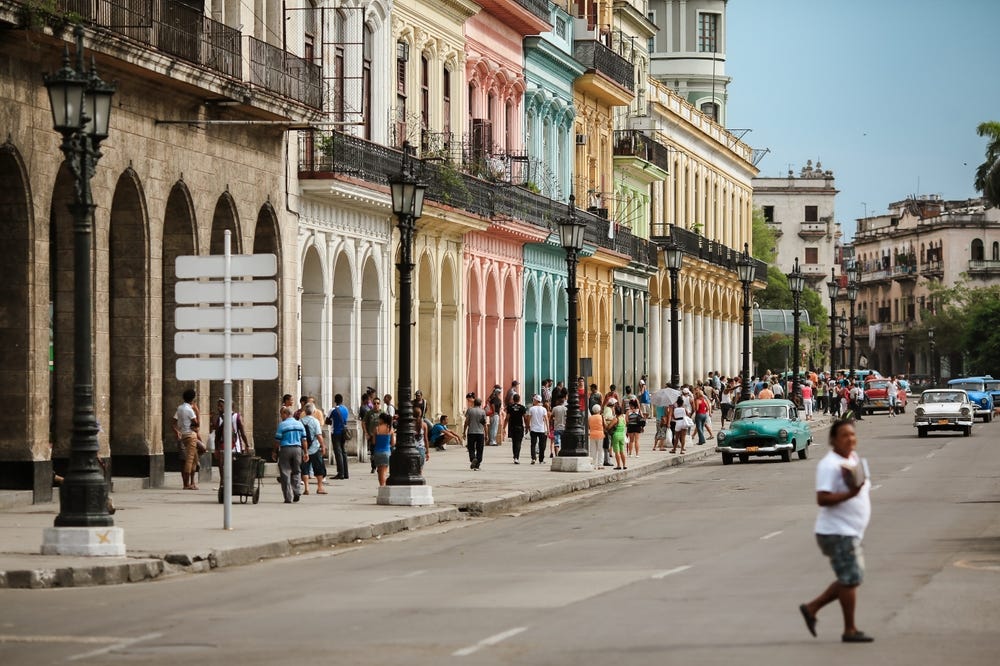U.N. General Assembly Calls for an End to the Decades-long Cuba Embargo
The United Nations General Assembly voted Wednesday (Oct.29) to condemn the U.S. economic embargo on Cuba for the 33rd consecutive year, as the island was forced to evacuate more than 735,000 people across the country and Hurricane Mellisa tore through the Caribbean.
The measure passed by a vote of 165 to 7, with 12 abstentions. The United States, Israel, Argentina, Hungary, North Macedonia, Paraguay and Ukraine opposed the resolution.
Last year’s vote was 187 to 2, with only the U.S. and Israel in opposition and one abstention, suggesting that Washington had succeeded this year in persuading some governments to change their stance.
Although the resolution carries no legal force, it reflects overwhelming international disapproval of the six-decade-old embargo, which Cuba and many nations call a “blockade.” It was adopted as Hurricane Melissa battered the island and as the U.S. expanded a military buildup in the Caribbean, heightening tensions in the region.
The U.N. resolution, titled “Necessity of ending the economic, commercial, and financial embargo imposed by the United States of America against Cuba,” has been presented every year since 1992. The measure calls for the repeal of U.S. laws, including the 1996 Helms-Burton Act, that extend the embargo’s effects to foreign companies doing business with Cuba. Supporters say the sanctions violate international law by restricting free trade and navigation.
The embargo was imposed in 1960 after Fidel Castro’s revolution nationalized U.S.-owned property. It has been periodically tightened and loosened under successive administrations, but remains largely intact. Cuba estimates that sanctions cost its economy $7.5 billion between March 2024 and February 2025, up from the previous year.
Relations briefly thawed in 2016, when President Barack Obama and then-Cuban President Raúl Castro restored diplomatic ties and Washington abstained from the annual vote for the first time. The rapprochement ended under President Donald Trump, who reinstated travel and trade restrictions and placed Cuba back on the U.S. list of state sponsors of terrorism. President Joe Biden maintained many of those measures before Trump’s return to office this year.
During the debate on Tuesday, U.S. Ambassador Mike Waltz called the resolution “political theater” and accused Havana of using the U.N. to deflect blame for its economic problems. “I would suggest that our member states stop appeasing the regime with their votes,” he said. “Cuba should not be allowed to cast itself as a victim of aggression while calling itself the enemy of the United States.”
Waltz’s remarks prompted Cuban Foreign Minister Bruno Rodríguez to interrupt, calling the ambassador’s remarks “uncivilized, crude and gross.”
Waltz replied, “This is also not a communist illegitimate legislature in Havana,” underscoring the deep hostility that still characterizes U.S.–Cuba relations.
After the vote, U.S. Ambassador Jeff Bartos said Washington was “satisfied to see so many countries send the regime a message that the international community will no longer tolerate its activities.” He expressed sympathy for Cubans facing the hurricane and the island’s economic difficulties but blamed Havana’s leadership for the crisis.
Cuba’s foreign minister charged the U.S. with orchestrating a campaign to sway votes.
In an interview with The Associated Press earlier in the week, Rodríguez said the State Department had pressured several European governments to oppose the resolution. A U.S. spokesperson denied the accusation, saying “the Cuban regime does not deserve the backing of America’s democratic allies.”
The vote took place as the U.S. expanded anti-narcotics operations off South America, a move Havana described as “aggressive, extraordinary and unjustified.” Some regional leaders fear the buildup could indicate wider action aimed at Venezuela, whose president, Nicolás Maduro, is under U.S. indictment for narcoterrorism. The Trump administration has accused Caracas of destabilizing the region and supporting illicit trafficking, while Maduro contends Washington seeks to seize Venezuela’s oil assets.
Cuba remains a close ally of Venezuela and has faced fresh scrutiny for its role in supporting Maduro’s government. Analysts say the perception that Cuban personnel have been involved in conflicts abroad, including reports of Cubans present in the war in Ukraine, may have influenced some countries’ votes against the resolution this year.
Cuba’s economy has been in steep decline since the pandemic. The government reports an abrupt contraction in gross domestic product, exacerbated by energy shortages, high inflation and food scarcity. Daily blackouts and lengthy queues for basic goods have become routine. Hundreds of thousands of Cubans have migrated since 2020, many settling in the U.S.
Havana attributes the crisis to U.S. sanctions, pandemic-related tourism losses and global price shocks. Critics of the government contend that state mismanagement and corruption have worsened the hardship. The government has faced waves of protests since 2021, the largest in decades, and has detained hundreds of demonstrators.
For more than three decades, the annual U.N. vote has served as a gauge of global opinion toward U.S. policy on Cuba. Over the years, many U.S. allies have long called for ending the embargo, arguing that it has failed to bring democratic change while worsening conditions for ordinary Cubans.
Despite that criticism, the embargo’s continuation rests with Congress, where repeal has little political momentum. Successive administrations have wielded the sanctions as leverage to press Havana on human rights abuses.
As the hurricane hammered Cuba’s western regions, Rodríguez insisted that the vote “sends a powerful message of solidarity” to the Cuban people. “The resolution is not binding,” he said, “but it is powerful.”



